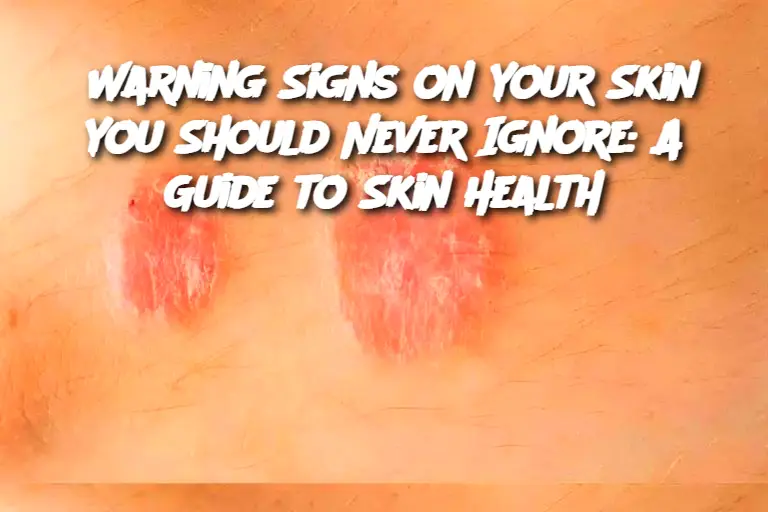ADVERTISEMENT
Introduction:
Your skin is the largest organ in your body and acts as a protective barrier against environmental threats. While it serves as your body’s shield, it also sends out signals that something may be wrong. Recognizing the warning signs that your skin is trying to communicate with you is crucial for maintaining overall health and well-being. Skin issues can range from mild irritations to more severe conditions, and early detection is key to preventing further complications. This article will highlight some of the warning signs on your skin that you should never ignore and provide helpful insights on how to take care of your skin.
Warning Signs to Watch for:
Persistent Skin Rashes or Redness: A rash or redness that doesn’t go away or spreads over time could be indicative of an underlying condition. While some rashes may result from allergies or irritants, others could point to more serious concerns like eczema, psoriasis, or autoimmune disorders. If the rash is persistent or accompanied by swelling, it’s important to consult with a healthcare professional.
Changes in Moles or Skin Lesions: Pay close attention to changes in moles or any new growths on your skin. If a mole becomes asymmetrical, grows larger, changes color, or bleeds, it may be a warning sign of skin cancer. Regularly checking your skin and getting any suspicious spots evaluated by a dermatologist can lead to early detection and a higher chance of successful treatment.
Itching that Won’t Go Away: While occasional itching can be caused by dry skin or insect bites, constant itching could indicate a more serious issue. Conditions like fungal infections, eczema, or even liver disease can cause persistent itching. If you experience prolonged itching, it’s best to seek professional advice.
Unexplained Bruising or Bleeding: If you notice bruises or cuts on your skin that don’t heal or appear without a clear cause, this could be a sign of a clotting disorder or an issue with your blood vessels. Similarly, spontaneous bleeding or excessive bruising could indicate an underlying health problem that requires medical attention.
Severe Acne or Breakouts: While occasional pimples are common, frequent or severe breakouts can signal an imbalance in your body. Hormonal changes, stress, and poor diet can contribute to acne, but persistent issues may be linked to conditions like polycystic ovary syndrome (PCOS) or hormonal imbalances. If your acne is severe or causing scars, consulting a dermatologist is recommended.
Peeling or Cracked Skin: If your skin starts peeling or cracking, especially in a large area or for no obvious reason, it may be a sign of a fungal infection, allergic reaction, or even a vitamin deficiency. While some skin peeling may be related to sunburn or dryness, persistent peeling warrants a medical evaluation.
Painful or Inflamed Skin: Painful skin that’s inflamed, swollen, or overly sensitive could point to an infection, a reaction to medications, or a more serious systemic condition. If the pain persists or worsens, it’s essential to seek prompt medical care.
Ingredients: Since this is more about general skin health rather than a recipe, we’ll focus on what "ingredients" are important for maintaining healthy skin:
Hydration: Drinking plenty of water to keep your skin hydrated.
Sunscreen: Protecting your skin from harmful UV rays with a broad-spectrum sunscreen.
Antioxidants: Consuming foods rich in antioxidants, like fruits and vegetables, to fight free radicals and promote healthy skin.
Moisturizers: Using hydrating lotions or oils to maintain skin's moisture barrier.
Topical Treatments: Using treatments like vitamin C, retinoids, or hyaluronic acid for skin rejuvenation.
Directions for Skincare Routine:
Cleansing: Start with a gentle cleanser to remove dirt, oil, and impurities. Make sure to choose one that matches your skin type (sensitive, oily, dry, or combination).
Moisturizing: Follow up with a good moisturizer to keep your skin hydrated. Look for ingredients like hyaluronic acid, glycerin, or ceramides.
Sunscreen Application: Always apply sunscreen as the last step in your routine to protect your skin from UV damage. Reapply throughout the day if you’re out in the sun for extended periods.
Treatment: Use targeted treatments such as serums or spot treatments for specific concerns like acne, pigmentation, or wrinkles.
Presentation and Storage Tips:
For the best results, store your skincare products in a cool, dry place, away from direct sunlight, which can degrade some active ingredients. Make sure to close the caps tightly to prevent contamination. Avoid using expired products, as they may cause irritation or not work as effectively.
Variations:
ADVERTISEMENT
